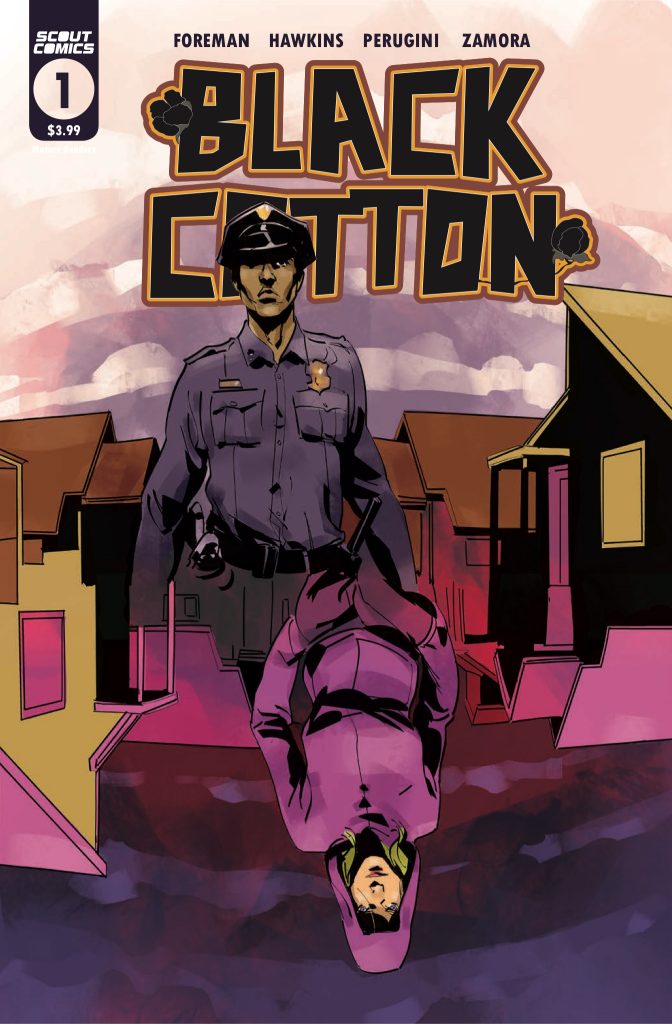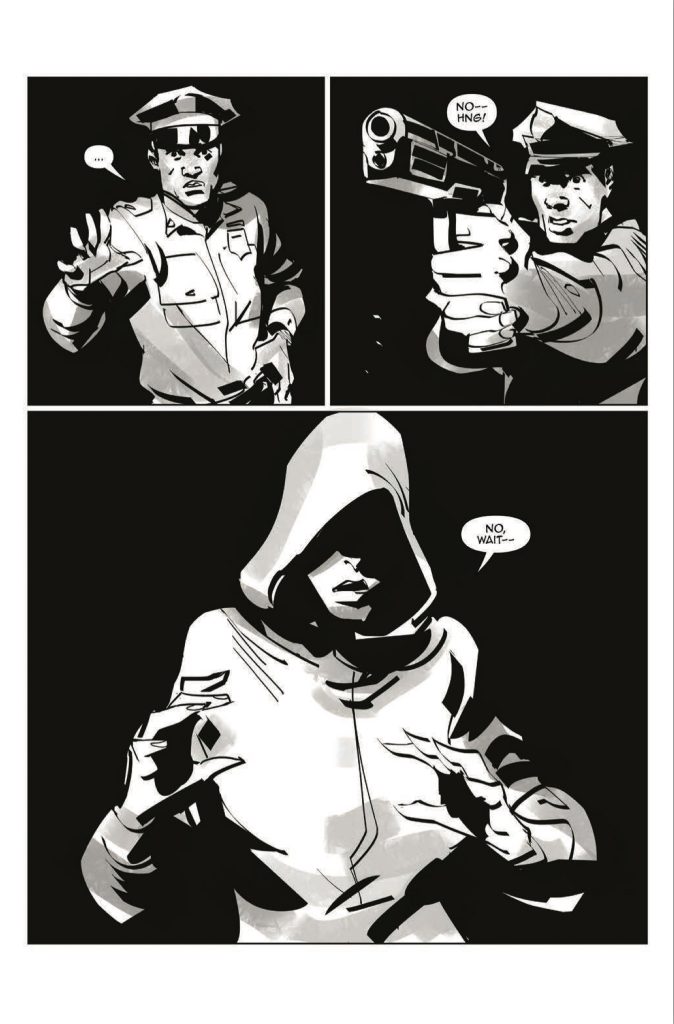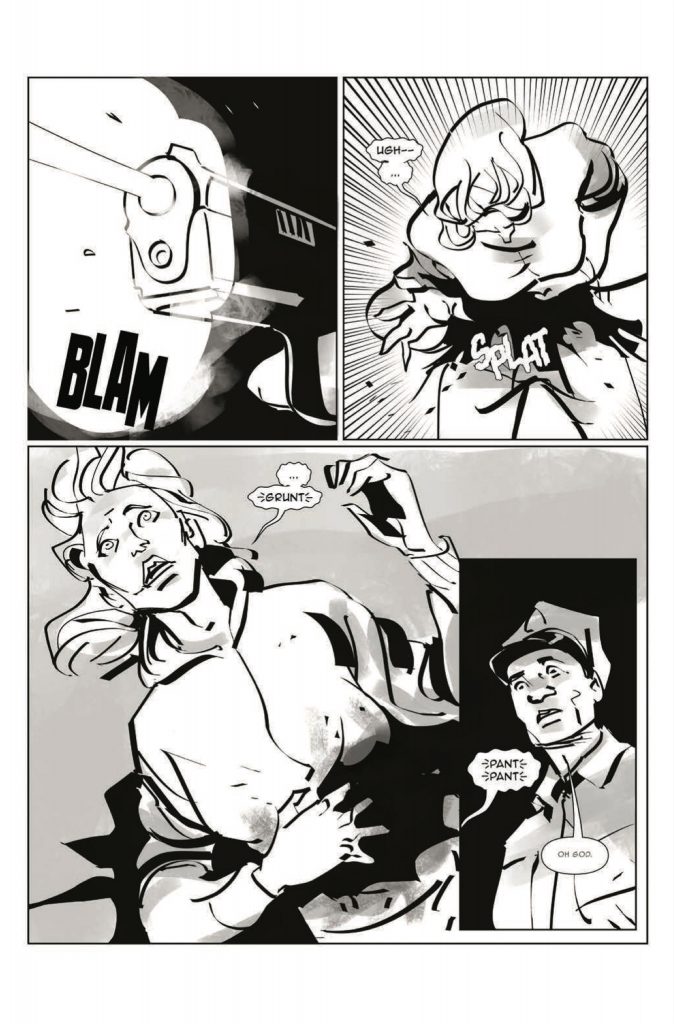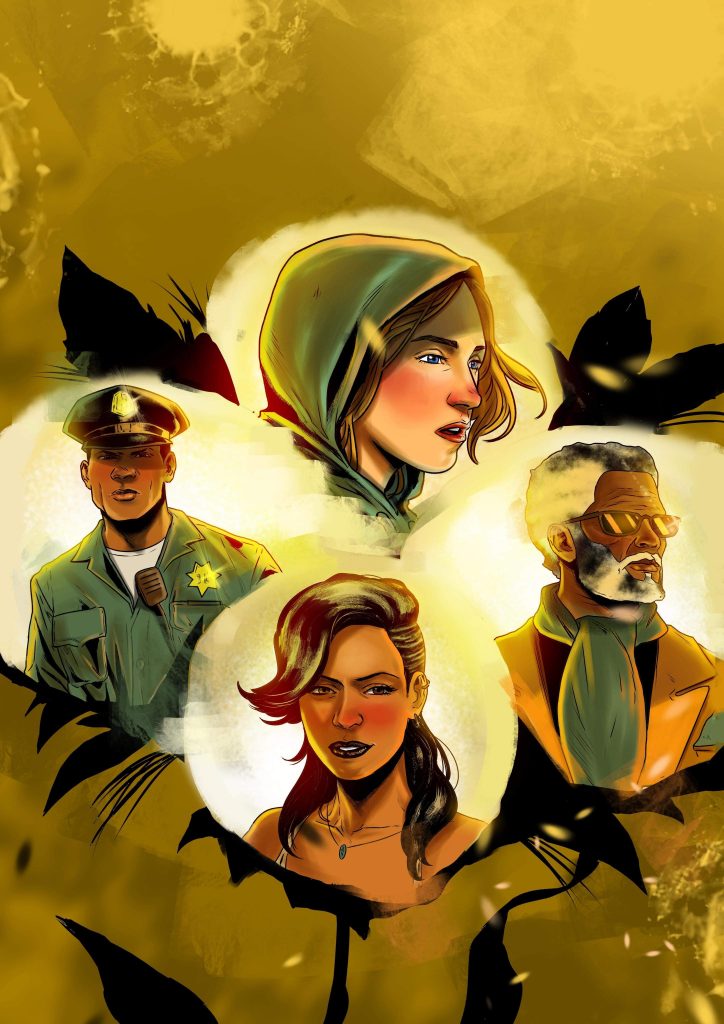
Elijah Cotton, the modern patriarch of the Cotton family and business mogul of Black Cotton Ventures, tries to manage the public outrage and fallout from his police officer son, Zion Cotton’s, shooting of a young white woman. Meanwhile, Qia Cotton, the only daughter of Eljiah and the CEO of Black Cotton Ventures, attempts to assuage the situation by paying off the victim and her family; Xavier Cotton, the youngest Cotton and sophomore in high school, works on a history project that takes him down a rabbit hole of family history.
- Black Cotton #1
- Scout Comics
- Created by Patrick Foreman & Brian Hawkins
- Scripted by Brian Hawkins
- Illustrated by Marco Perugini
- Letters by Francisco Zamora
- Available February 10, 2021
“Hey!”
This is how Officer Zion Cotton chooses to approach an unidentified person, from behind and without identifying himself. Then, when the individual turns in response to the call, Officer Cotton panics and goes for his gun as he barks out, “Don’t turn around!” Now the person, in this case a young woman, confused and in all likelihood more than a little afraid as this armed & unstable police officer is shouting and drawing down on her. With her obviously empty hands in plain view, Officer Cotton’s panic increases- probably due to her very threatening hoodie- and he squeezes off a shot, hitting her in the stomach. Finally, the realization of what’s happened dawns on Officer Cotton as the woman lies on the ground, gasping for breath and bleeding out onto the pavement.
No, this isn’t a news report. This is the opening to Black Cotton, a title from Scout Comics set to release in February of 2021. The first time I read this scene, I’m not going to lie about it… it irritated me. I thought great, another story about an inept cop randomly gunning down the helpless. Finishing the issue, my irritation eased up but it left me with questions. I took those questions to co-writer Brian Hawkins, asking what the driving creative force was behind Black Cotton, and what it that the creative team hoped to accomplish.
Before we go any farther or address Brian’s responses, I think I should put something out there. I am German & Irish, so pretty much one of the whitest guys you’re ever going to meet. I was hesitant to review Black Cotton at first, but that had nothing to do with the creative approach to what has recently become a very hot-button topic. It certainly had nothing to do with the writing, which is very good, or anything to do with the talent on the book. I think it really just came down to the idea that as a very white man, I wouldn’t have anything relevant to say about the book or its subject matter. And I felt like anything I did say would be liable to make somebody mad, triggering one emotional response or another depending on the leanings of the reader in question.
So I did what any good reviewer would do, and I read the issue again. On the second read-through, I thought that with everything the comic had going for it, I should at least see if there was any insight to be gained from one of the creators. This brings us back to Brian Hawkins’s response to my question.
First, Hawkins thanked me for the taking the time to read the book, and for showing enough interest to try to find out a little more about the intent behind it. Rather than go into great detail, he shot me the link to an interview with Monkeys Fighting Robots (check out the entire interview here) he & co-creator Patrick Foreman did, where he felt that my questions might be addressed in detail. In short, Black Cotton was established as “another perception of reality to challenge how we perceive this reality.” Foreman adds that “it all began with the famous and one of the most asked questions; ‘What if…’”.
“What if” Africans had not been brought to America as slaves, but immigrated along with the Europeans? Through hard work and shrewd strategy, the colonizing Africans grew to become the backbone of the new nation’s upper class, outnumbering and outmaneuvering the Europeans in a reversal of what we see in the world today. Hawkins & Foreman have outright omitted slavery as a part of their America’s history, instead leaning into the idea that prejudice and classism are inherent stumbling blocks built into the human psyche, existing regardless of specific circumstances. It’s a depressing thought, but not one that we can discount out of hand. As to the tragic event that kicks off this story, the worst police stop ever that leads to crowds proclaiming that “White Lives Matter!” and demanding an “End to racial Injustice”, I came to realize that it had to be what it was. Despite my irritation at another “lousy cop killing an innocent” plot hook, it pretty much had to be an obvious case of police incompetence. Any gray area at all in that part of the story could have diverted the attention away from the direction that I believe Hawkins & Foreman are trying to take it.
The creative decision to eliminate the color from a comic about racial disparity was made in the early stages, and is very ably handled by artist Marco Perugini. Not strictly just “black & white”, but more of a grayscale scheme, Black Cotton is a story based in a reality very similar to ours. With that in mind, Perugini sticks close to home in his work. His characters, primarily Clan Cotton in this opening issue, are held to an ideal of simplicity. Everyone looks like they could be folk you’d meet walking down the street on a daily basis (if in the new Corona Age we still actually went out and met people), right down to youngest brother Xavier with his nose constantly aimed at his smartphone. Perugini also works very well in the grayscale format, his line work kept clean and clear without shorting us on essential details. I’m a fan of comics done in black & white, particularly when the artist is able to hold up their end without cluttering the page with too much visual information. Perugini does it right, and the style blends in with the storytelling beautifully. Finally, his full color cover art is great as it illustrates a theme of reflections that’s central to the story.
By no means is Black Cotton going to be an easy read for everybody, and different readers are going to pull different meanings from its pages. That’s as it should be. With the understanding that much of my own interpretation comes from my conversation with Brian Hawkins (thanks again for taking the time, Brian) and the interview referenced previously, these are my personal takeaways, not final cannon to be etched in stone and revered as gospel. At its core, this is a story designed to prompt open and honest discussion on topics that aren’t always easy for people to discuss. Look at my personal reluctance to approach a review as evidence of that, and it’s pretty easy to see how the decision to use an alternate reality might provide the distancing needed to make conversation a little easier for everyone.
Now, I’m gonna go find some lighter reading… something simpler & less provoking. Maybe something by Poe or Dostoyevsky.
Final Score: 11/13



